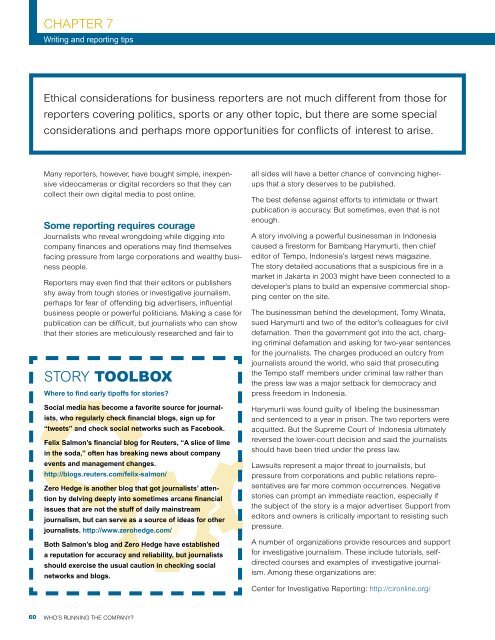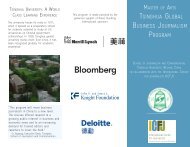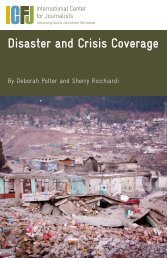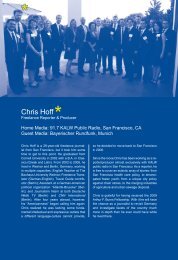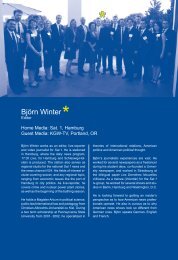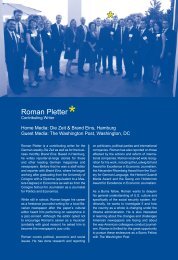Who's Running the Company? - International Center for Journalists
Who's Running the Company? - International Center for Journalists
Who's Running the Company? - International Center for Journalists
You also want an ePaper? Increase the reach of your titles
YUMPU automatically turns print PDFs into web optimized ePapers that Google loves.
CHAPTER 7<br />
Writing and reporting tips<br />
Ethical considerations <strong>for</strong> business reporters are not much different from those <strong>for</strong><br />
reporters covering politics, sports or any o<strong>the</strong>r topic, but <strong>the</strong>re are some special<br />
considerations and perhaps more opportunities <strong>for</strong> conflicts of interest to arise.<br />
Many reporters, however, have bought simple, inexpensive<br />
videocameras or digital recorders so that <strong>the</strong>y can<br />
collect <strong>the</strong>ir own digital media to post online.<br />
Some reporting requires courage<br />
<strong>Journalists</strong> who reveal wrongdoing while digging into<br />
company finances and operations may find <strong>the</strong>mselves<br />
facing pressure from large corporations and wealthy business<br />
people.<br />
Reporters may even find that <strong>the</strong>ir editors or publishers<br />
shy away from tough stories or investigative journalism,<br />
perhaps <strong>for</strong> fear of offending big advertisers, influential<br />
business people or powerful politicians. Making a case <strong>for</strong><br />
publication can be difficult, but journalists who can show<br />
that <strong>the</strong>ir stories are meticulously researched and fair to<br />
STORY TOOLBOX<br />
Where to find early tipoffs <strong>for</strong> stories?<br />
Social media has become a favorite source <strong>for</strong> journalists,<br />
who regularly check financial blogs, sign up <strong>for</strong><br />
“tweets” and check social networks such as Facebook.<br />
Felix Salmon’s financial blog <strong>for</strong> Reuters, “A slice of lime<br />
in <strong>the</strong> soda,” often has breaking news about company<br />
events and management changes.<br />
http://blogs.reuters.com/felix-salmon/<br />
Zero Hedge is ano<strong>the</strong>r blog that got journalists’ attention<br />
by delving deeply into sometimes arcane financial<br />
issues that are not <strong>the</strong> stuff of daily mainstream<br />
journalism, but can serve as a source of ideas <strong>for</strong> o<strong>the</strong>r<br />
journalists. http://www.zerohedge.com/<br />
Both Salmon’s blog and Zero Hedge have established<br />
a reputation <strong>for</strong> accuracy and reliability, but journalists<br />
should exercise <strong>the</strong> usual caution in checking social<br />
networks and blogs.<br />
all sides will have a better chance of convincing higherups<br />
that a story deserves to be published.<br />
The best defense against ef<strong>for</strong>ts to intimidate or thwart<br />
publication is accuracy. But sometimes, even that is not<br />
enough.<br />
A story involving a powerful businessman in Indonesia<br />
caused a firestorm <strong>for</strong> Bambang Harymurti, <strong>the</strong>n chief<br />
editor of Tempo, Indonesia’s largest news magazine.<br />
The story detailed accusations that a suspicious fire in a<br />
market in Jakarta in 2003 might have been connected to a<br />
developer’s plans to build an expensive commercial shopping<br />
center on <strong>the</strong> site.<br />
The businessman behind <strong>the</strong> development, Tomy Winata,<br />
sued Harymurti and two of <strong>the</strong> editor’s colleagues <strong>for</strong> civil<br />
defamation. Then <strong>the</strong> government got into <strong>the</strong> act, charging<br />
criminal defamation and asking <strong>for</strong> two-year sentences<br />
<strong>for</strong> <strong>the</strong> journalists. The charges produced an outcry from<br />
journalists around <strong>the</strong> world, who said that prosecuting<br />
<strong>the</strong> Tempo staff members under criminal law ra<strong>the</strong>r than<br />
<strong>the</strong> press law was a major setback <strong>for</strong> democracy and<br />
press freedom in Indonesia.<br />
Harymurti was found guilty of libeling <strong>the</strong> businessman<br />
and sentenced to a year in prison. The two reporters were<br />
acquitted. But <strong>the</strong> Supreme Court of Indonesia ultimately<br />
reversed <strong>the</strong> lower-court decision and said <strong>the</strong> journalists<br />
should have been tried under <strong>the</strong> press law.<br />
Lawsuits represent a major threat to journalists, but<br />
pressure from corporations and public relations representatives<br />
are far more common occurrences. Negative<br />
stories can prompt an immediate reaction, especially if<br />
<strong>the</strong> subject of <strong>the</strong> story is a major advertiser. Support from<br />
editors and owners is critically important to resisting such<br />
pressure.<br />
A number of organizations provide resources and support<br />
<strong>for</strong> investigative journalism. These include tutorials, selfdirected<br />
courses and examples of investigative journalism.<br />
Among <strong>the</strong>se organizations are:<br />
<strong>Center</strong> <strong>for</strong> Investigative Reporting: http://cironline.org/<br />
60<br />
WHO’S RUNNING THE COMPANY?


